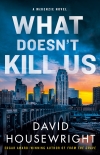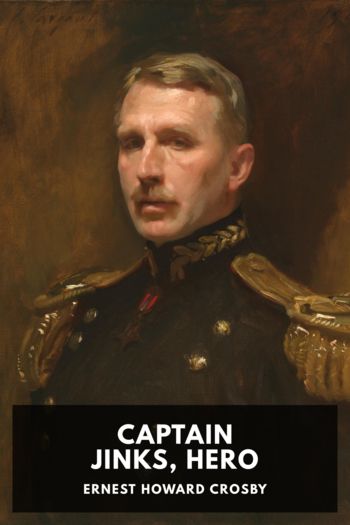What Doesn't Kill Us--A McKenzie Novel, David Housewright [best young adult book series .txt] 📗

- Author: David Housewright
Book online «What Doesn't Kill Us--A McKenzie Novel, David Housewright [best young adult book series .txt] 📗». Author David Housewright
Chopper wheeled himself from one geek to the next, glancing over their shoulders at the screens in front of them. Three were selling tickets and one was buying. He stopped behind the buyer, Chopper’s chief computer geek.
That was Chopper’s term, not mine. I preferred computer nerd. The geek-in-chief was wearing a T-shirt with a pic of Commander Geordi La Forge, the character played by LeVar Burton in the Star Trek: The Next Generation TV series. The shirt looked like the geek had been wearing it since he was three years old.
“Well?” Chopper asked.
“It’s working,” he said.
“It is?”
“We’re able to bypass all the CAPTCHAs and the reCAPTCHAs pretty easily; I’m not having any problems buying bundles of seats.”
Chopper’s eyes lit up. Like most ticket scalpers, he had been hampered by availability. He would have associates sitting at every terminal to grab concert and sports tickets when they became available online. Or he would hire guys to stand in line at the on-site ticket booths. Or he would tap insiders who had access to the events.
But most ticket sellers had strict rules about how many seats a person could reserve at a time, usually four, and sophisticated security systems in place to prevent cheating. Not only that, it was illegal. While there was no federal law against ticket scalping, many states had their own restrictions. There was also the Better Online Ticket Sales Act of 2016 which made it unlawful nationwide to use bots to vacuum up tickets at a rapid rate. Which Chopper claimed was un-American because it prevented him from amassing enough product—that’s how he viewed tickets, as product—to make an honest living.
Chopper’s new software, however, purchased just the day before by a white boy who seemed very nervous, as if this was the first time he had stepped out of line, was allowing his bots to circumvent the ticket sellers’ bots so he could now buy an unlimited number of the best seats in the house, wherever that house might be, which he could then resell for whatever his customers were willing to pay.
“Fans dictate the market price,” Chopper once told me. “If people refuse to pay the prices I charge, I have to lower my prices, right? It’s called capitalism, the backbone of America.”
“Software was worth the price then,” is what he told the geek.
“For the time being,” the geek said. “It’s just another advance in artificial intelligence that someone will probably counter next week.”
“Till then, buy my man, buy. Bieber, Bruno, Elton John, Lizzo, John Legend, Snoop Dogg, Taylor Swift, Monster Jam, vroom, vuhroom…”
“We’ve got the list.”
“Buy, baby, buy. Vroom.”
While they were buying, Herzog walked into the office.
“Yo, Herzy,” Chopper said. “Where you been, man?”
Herzog gestured with his head for Chopper to join him next to Chopper’s desk where the geeks wouldn’t hear them talking.
“Know a man named Jamal Brown?” Herzog asked.
“No. Should I?”
“Jamal used to run wit’ the Red Dragons.”
“Fuckin’ dead and gone, them Dragons.”
“Not all of ’em. Jamal, he’s been thrivin’ since the gang went under. Dealin’ opioids.”
“I’m outta that life. You are too, ain’t ya?”
“That’s not the point.”
“What’s the point?”
“Where Jamal’s been gettin’ his supply.”
“Do we care?”
“If you don’t wanna know.”
Herzog turned and started walking away.
“Wait,” Chopper said.
Herzog turned back. He was grinning.
“What?” Chopper asked.
“RT’s Basement.”
“The fuck you say.”
“Word is Jamal’s been getting’ his opioids outta the back room.”
“I didn’t know the place had a back room.”
“Lotta shit RT didn’t tell us. We asked so politely, too.”
“We should ask again, maybe not so polite this time.”
“What I was thinking,” Herzog said. “See if he’s gotta camera pointin’ at the back room.”
“Be fucking dumb if he did, recordin’ the commission of a crime.”
“Anything ’bout RT tells you he ain’t dumb?”
“First thing, though, I think we should talk t’ Jamal. Can you arrange that?”
“Hard or soft.”
“Soft,” Chopper said. “I don’ care what Jamal does for a livin’.”
“’Kay.”
“RT dealin’ outta the back door of his place, think the po-lice know about that?”
“Some might be takin’ the price to look another way. Bet I know one cop who ain’t, though.”
“We’ll have a conversation with Commander Dunston once we know what we’re gonna say. You surprise me, though, Herzy. Steppin’ up to find out ’bout McKenzie after actin’ like you didn’t care.”
“I know how much you like the man.”
SIX
Shipman had been inside my condominium twice before. The first time was to interrogate me about a truck belonging to a friend of mine that exploded, sending a sliver of shrapnel through my shoulder. The second time was after a man was shot to death in St. Paul. Since he had lived in my building, she naturally assumed I was somehow involved. ’Course, at the time, so did I. In neither case did she have the opportunity to get a good look at the place. Now she had all the time in the world.
After hanging her coat and bag on the rack near the door, Shipman went to the refrigerator, surveyed its contents, and retrieved a bottle of Summit EPA—who does that? After opening it, she started exploring. I wouldn’t have been surprised to learn that she sat on all of our chairs and sofas one at a time to see if any of them were just right. I did learn that she stopped at the north wall and gazed through the tinted glass at the mighty Mississippi. That’s because she asked me later how much the view cost. I told her about a half million bucks when we bought the place; much more now. She said it was nice, but not that nice.
Next, she sat at Nina’s Steinway and played a few tunes—seriously, who does that?! She told me she figured the baby grand must have retailed for $60,000. Around there, I said. She said she had an old Yamaha upright that she bought





Comments (0)